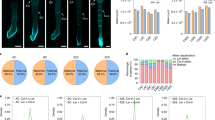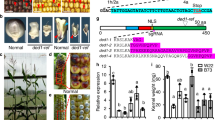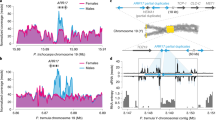Abstract
Zygotic genome activation in metazoans typically occurs several hours to a day after fertilization, and thus maternal RNAs and proteins drive early animal embryo development1. In plants, despite several molecular studies of post-fertilization transcriptional activation, the timing of zygotic genome activation remains a matter of debate. For example, two recent reports that used different hybrid ecotype combinations for RNA sequence profiling of early Arabidopsis embryo transcriptomes came to divergent conclusions. One identified paternal contributions that varied by gene, but with overall maternal dominance2, while the other found that the maternal and paternal genomes are transcriptionally equivalent3. Here we assess paternal gene activation functionally in an isogenic background, by performing a large-scale genetic analysis of 49 EMBRYO DEFECTIVE genes and testing the ability of wild-type paternal alleles to complement phenotypes conditioned by mutant maternal alleles. Our results demonstrate that wild-type paternal alleles for nine of these genes are completely functional 2 days after pollination, with the remaining 40 genes showing partial activity beginning at 2, 3 or 5 days after pollination. Using our functional assay, we also demonstrate that different hybrid combinations exhibit significant variation in paternal allele activation, reconciling the apparently contradictory results of previous transcriptional studies2,3. The variation in timing of gene function that we observe confirms that paternal genome activation does not occur in one early discrete step, provides large-scale functional evidence that maternal and paternal genomes make non-equivalent contributions to early plant embryogenesis, and uncovers an unexpectedly profound effect of hybrid genetic backgrounds on paternal gene activity.
This is a preview of subscription content, access via your institution
Access options
Subscribe to this journal
Receive 51 print issues and online access
$199.00 per year
only $3.90 per issue
Buy this article
- Purchase on Springer Link
- Instant access to full article PDF
Prices may be subject to local taxes which are calculated during checkout



Similar content being viewed by others
References
Tadros, W. & Lipshitz, H. D. The maternal-to-zygotic transition: a play in two acts. Development 136, 3033–3042 (2009)
Autran, D. et al. Maternal epigenetic pathways control parental contributions to Arabidopsis early embryogenesis. Cell 145, 707–719 (2011)
Nodine, M. D. & Bartel, D. P. Maternal and paternal genomes contribute equally to the transcriptome of early plant embryos. Nature 482, 94–97 (2012)
Grimanelli, D., Perotti, E., Ramirez, J. & Leblanc, O. Timing of the maternal-to-zygotic transition during early seed development in maize. Plant Cell 17, 1061–1072 (2005)
Zhao, J. et al. Dynamic changes of transcript profiles after fertilization are associated with maternal elimination in tobacco zygote, and mark the onset of the maternal-to-zygotic transition. Plant J. 65, 131–145 (2011)
Vielle-Calzada, J. P., Baskar, R. & Grossniklaus, U. Delayed activation of the paternal genome during seed development. Nature 404, 91–94 (2000)
Baroux, C., Blanvillain, R. & Gallois, P. Paternally inherited transgenes are down-regulated but retain low activity during early embryogenesis in Arabidopsis. FEBS Lett. 509, 11–16 (2001)
Pillot, M. et al. Embryo and endosperm inherit distinct chromatin and transcriptional states from the female gametes in Arabidopsis. Plant Cell 22, 307–320 (2010)
Sprunck, S. et al. The transcript composition of egg cells changes significantly following fertilization in wheat (Triticum aestivum L.). Plant J. 41, 660–672 (2005)
Meyer, S. & Scholten, S. Equivalent parental contribution to early plant zygotic development. Curr. Biol. 17, 1686–1691 (2007)
Weijers, D., Geldner, N., Offringa, R. & Jürgens, G. Seed development: early paternal gene activity in Arabidopsis. Nature 414, 709–710 (2001)
Lukowitz, W., Roeder, A., Parmenter, D. & Somerville, C. A MAPKK kinase gene regulates extra-embryonic cell fate in Arabidopsis. Cell 116, 109–119 (2004)
Ueda, M., Zhang, Z. & Laux, T. Transcriptional activation of Arabidopsis axis patterning genes WOX8/9 links zygote polarity to embryo development. Dev. Cell 20, 264–270 (2011)
Barber, W. T. et al. Repeat associated small RNAs vary among parents and following hybridization in maize. Proc. Natl Acad. Sci. USA 109, 10444–10449 (2012)
Greaves, I. K. et al. Trans chromosomal methylation in Arabidopsis hybrids. Proc. Natl Acad. Sci. USA 109, 3570–3575 (2012)
Groszmann, M. et al. Changes in 24-nt siRNA levels in Arabidopsis hybrids suggest an epigenetic contribution to hybrid vigor. Proc. Natl Acad. Sci. USA 108, 2617–2622 (2011)
Shen, H. et al. Genome-wide analysis of DNA methylation and gene expression changes in two Arabidopsis ecotypes and their reciprocal hybrids. Plant Cell 24, 875–892 (2012)
Tzafrir, I. et al. Identification of genes required for embryo development in Arabidopsis. Plant Physiol. 135, 1206–1220 (2004)
Muralla, R., Lloyd, J. & Meinke, D. Molecular foundations of reproductive lethality in Arabidopsis thaliana. PLoS ONE 6, e28398 (2011)
Gillmor, C. S. et al. The MED12–MED13 module of Mediator regulates the timing of embryo patterning in Arabidopsis. Development 137, 113–122 (2010)
Wuest, S. E. et al. Arabidopsis female gametophyte gene expression map reveals similarities between plant and animal gametes. Curr. Biol. 20, 506–512 (2010)
Belmonte, M. F. et al. Comprehensive developmental profiles of gene activity in regions and subregions of the Arabidopsis seed. Proc. Natl Acad. Sci. USA 110, E435–E444 (2013)
Hsieh, T.-F. et al. Regulation of imprinted gene expression in Arabidopsis endosperm. Proc. Natl Acad. Sci. USA 108, 1755–1762 (2011)
Costa, L. M. et al. Central cell-derived peptides regulate early embryo patterning in flowering plants. Science 344, 168–172 (2014)
Nordborg, M. et al. The pattern of polymorphism in Arabidopsis thaliana. PLoS Biol. 3, e196 (2005)
Matsushita, T., Mochizuki, M. & Nagatani, A. Dimers of the N-terminal domain of phytochrome B are functional in the nucleus. Nature 424, 571–574 (2003)
Acknowledgements
This study was facilitated by the efforts of D. Meinke and collaborators in creating and maintaining the SeedGenes Project (http://www.seedgenes.org). Seeds were obtained from the Arabidopsis Biological Resource Center (http://abrc.osu.edu). We thank S. Poethig, in whose laboratory C.S.G. generated GCT and CCT GUS reporter constructs, K. Gallagher for reagents, C. Silva-Ortega for preliminary experiments, A. de Luna, D. Lepe-Soltero and C. Abreu-Goodger for suggestions on data analysis and presentation, R. Datla for suggesting Col/Tsu hybrid, D. Bergmann for advice, and L. Herrera-Estrella, D. Autran, C. Baroux, J.-P. Vielle-Calzada and D. Grimanelli for reading the manuscript. Research was supported by a CONACyT graduate fellowship to G.D.T.-D.L. (No. 300802), a CONACyT postdoctoral fellowship to M.G.-A., a CONACyT research grant (Ciencia Básica No. 152333) to C.S.G., and by CINVESTAV institutional funds.
Author information
Authors and Affiliations
Contributions
G.D.T.-D.L. performed phenotypic characterization of emb phenotypes and embryo complementation experiments with assistance from M.G.-A. and C.S.G.; C.S.G. made GUS reporter constructs; M.G.-A. performed GUS reporter experiments with assistance from G.D.T.-D.L.; G.D.T.-D.L., M.G.-A. and C.S.G. analysed data; G.D.T.-D.L. and C.S.G. wrote the paper.
Corresponding author
Ethics declarations
Competing interests
The authors declare no competing financial interests.
Supplementary information
Supplementary Information
This file contains Supplementary Tables 1-6 and Supplementary Dataset 1. (PDF 16077 kb)
Rights and permissions
About this article
Cite this article
Del Toro-De León, G., García-Aguilar, M. & Gillmor, C. Non-equivalent contributions of maternal and paternal genomes to early plant embryogenesis. Nature 514, 624–627 (2014). https://doi.org/10.1038/nature13620
Received:
Accepted:
Published:
Issue Date:
DOI: https://doi.org/10.1038/nature13620
This article is cited by
-
Paternal DNA methylation is remodeled to maternal levels in rice zygote
Nature Communications (2023)
-
Transcriptome analysis of ovules offers early developmental clues after fertilization in Cicer arietinum L.
3 Biotech (2023)
-
Intracellular dynamics and transcriptional regulations in plant zygotes: a case study of Arabidopsis
Plant Reproduction (2020)
-
One-step genome editing of elite crop germplasm during haploid induction
Nature Biotechnology (2019)
-
A male-expressed rice embryogenic trigger redirected for asexual propagation through seeds
Nature (2019)
Comments
By submitting a comment you agree to abide by our Terms and Community Guidelines. If you find something abusive or that does not comply with our terms or guidelines please flag it as inappropriate.



